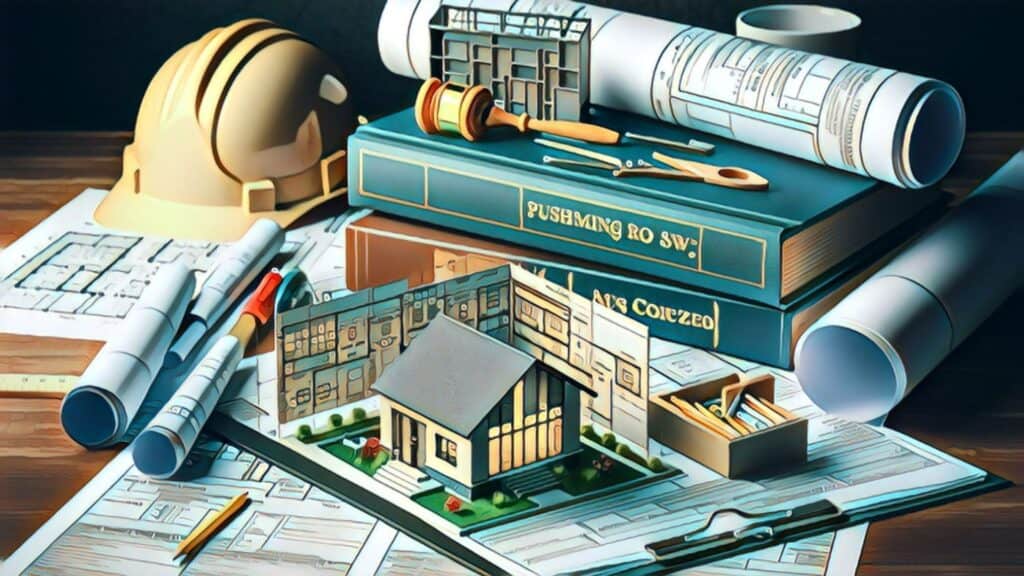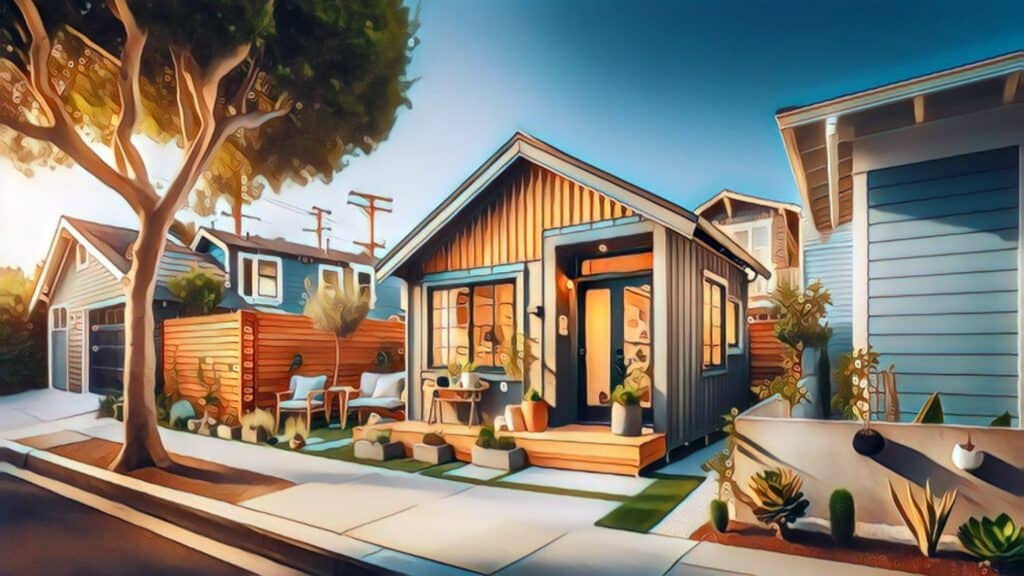Key Takeaways
- Understanding ADUs: Accessory Dwelling Units (ADUs) are valuable additions to properties, offering flexible living spaces and potential rental income.
- Compliance and Planning: Ensuring legal compliance, obtaining necessary permits, and thoughtful planning are essential when building and renting out an ADU.
- Effective Management: Successful ADU rental involves setting fair rental rates, drafting comprehensive lease agreements, and maintaining a good landlord-tenant relationship.

Introduction to ADU Rentals
What is an ADU (Accessory Dwelling Unit)?
An Accessory Dwelling Unit (ADU), also known as a secondary suite or granny flat, is a small, independent residential dwelling unit located on the same lot as a larger, primary home.
ADUs can be detached from the main house, like a backyard cottage, or attached, such as a basement suite.
They offer a flexible housing option, allowing homeowners to maximize their property’s potential.
Importance of ADUs in the Rental Market
ADUs play a significant role in the rental market.
They provide affordable housing options in urban and suburban areas where rental space is often scarce and expensive.
For homeowners, ADUs are an excellent way to generate additional income, increase property value, and offer housing solutions in communities with tight rental markets.
They cater to a diverse group of renters, from students and young professionals to small families and the elderly.

Planning and Building an ADU
Steps to Build an ADU
Building an ADU involves several key steps, starting with understanding local zoning laws and obtaining necessary permits.
Homeowners should consider the size, location, and design of the ADU to ensure it meets local codes and fits well with their property.
Engaging with architects or contractors experienced in ADU projects is crucial for navigating the complexities of construction, including utilities, access, and building materials.
Considering the Essentials for an ADU Rental
When planning an ADU for rental purposes, it’s important to focus on functionality and appeal.
Essential elements include a well-designed layout that maximizes space, modern amenities, and privacy features.
Additionally, considering energy efficiency and sustainability can make the ADU more attractive to potential renters and reduce long-term maintenance costs.

Understanding Rental Laws and Regulations
Navigating Local Rental Laws and Regulations
Before renting out an ADU, it’s essential to familiarize yourself with the local rental laws and regulations.
These can vary significantly from one location to another and may cover aspects like rent control, tenant rights, and safety standards.
Understanding these laws ensures that you, as a landlord, remain compliant and avoid potential legal issues.
Importance of Permits and Legal Compliance
Obtaining the proper permits is a critical step in the process of renting out an ADU.
This often involves inspections to ensure the unit meets building codes and safety standards.
Legal compliance extends to drawing up rental agreements, which must adhere to local housing laws.
Ensuring your ADU meets all legal requirements not only protects you but also provides peace of mind to your renters.

Preparing Your ADU for Rent
Essential Steps Before Listing an ADU Rental
Preparation is key to successfully renting out your ADU.
This includes thorough cleaning, maintenance checks, and possibly updating or renovating the space to make it more appealing.
Ensuring that all appliances are in working order, the unit is properly insulated, and that there are functioning smoke and carbon monoxide detectors is part of this process.
Also, setting up utilities, whether included in the rent or separately, needs to be arranged before listing.
What Renters Are Looking for in an ADU
Today’s renters look for more than just a place to live; they seek comfort, convenience, and style.
Features like high-speed internet, modern appliances, efficient storage, and a well-maintained outdoor space can make your ADU stand out.
Additionally, highlighting any unique aspects, like eco-friendly elements or smart home technology, can attract a broader range of potential renters.

Setting Rental Rates and Terms
How to Determine Rental Rates for Your ADU
Determining the right rental price for your ADU involves several factors.
Research the local rental market to understand what similar units are charging.
Consider your ADU’s size, location, amenities, and any unique features it offers.
It’s important to strike a balance between competitive pricing and ensuring your costs, including mortgage, maintenance, and utilities, are covered.
Crafting a Fair and Comprehensive Rental Agreement
A well-crafted rental agreement is essential for a smooth landlord-tenant relationship.
This agreement should clearly outline terms including rent amount, payment deadlines, lease duration, security deposit details, and maintenance responsibilities.
It should also cover rules regarding pets, noise, and guest policies.
Ensuring the agreement complies with local laws will protect both you and your tenant.
ADU Fun Fact
In Portland, Oregon, the city government was so committed to promoting ADUs as a solution to housing shortages that they waived the System Development Charges, fees typically required for new developments, for ADUs.
This waiver, which lasted from 2010 to 2018, led to a significant surge in ADU development in Portland, making it one of the leading cities in ADU growth in the United States.
This policy was a unique and proactive approach to encourage urban density and provide more affordable housing options.
—
Source: Local Housing Solutions

Effective Property Management Strategies
Managing the Rental Unit: DIY vs. Hiring a Property Management Company
When it comes to managing your ADU as a rental, you’ll want to decide whether to handle it yourself or hire a property management company.
Doing it yourself can be more hands-on and cost-effective, but it also requires more time and knowledge about being a landlord.
A property management company, on the other hand, can handle everything from finding tenants to maintenance, which can be especially beneficial if you plan to rent out the ADU on a long-term basis.
Best Practices for a Smooth Landlord-Renter Relationship
Building a positive relationship with your renters is key to a successful ADU rental.
Be clear and consistent in your communications, especially regarding lease agreements and expectations.
Regular maintenance and prompt response to repair requests can significantly improve the rental experience.
Also, understanding and respecting tenant rights, as outlined in California state law and other local regulations, is crucial for becoming a landlord.

Marketing Your ADU Rental
Strategies to Market Your ADU Rental Unit
When it’s time to rent out your ADU, effective marketing is essential.
Utilize online rental platforms and local resources like community boards or social media.
Creating a detailed listing for your ADU, known as a guest house or rental ADU, with high-quality photos and a clear description of its features can attract many renters.
Platforms like Craigslist and Airbnb can be particularly useful, especially if you’re considering a short-term rental for your ADU.
Utilizing Online Platforms and Local Resources
In addition to online listings, consider word-of-mouth referrals and local real estate agents to find tenants.
If you’re in a city like Los Angeles or San Francisco, where rental properties are in high demand, these methods can be especially effective.
Remember to set minimum rental periods in your advertisements if required by local laws, and be transparent about what you’ll charge for rent.

Conclusion
Summarizing the Key Steps in Renting Out an ADU
Renting out an ADU, whether as a long-term rental property or on platforms like Airbnb, involves careful planning and consideration.
From understanding and complying with local regulations to setting appropriate rental rates, every step is crucial.
For California homeowners, particularly in areas like Los Angeles and San Francisco, building an accessory dwelling unit can add significant value to your property and provide a steady source of rental income.
Encouraging Responsible and Profitable Landlordship
As you embark on this journey to rent out your ADU or consider building an ADU to rent, remember the importance of responsible landlordship.
Keep in mind factors like how much you can charge for rent, the potential to increase your property taxes, and the need to potentially pay taxes on the rental income you receive.
Embracing the role of a landlord means not only reaping financial benefits but also contributing to your community by providing quality housing options.
References
- Accessory Dwelling Units: What Are They and Why Do You Need One
- Accessory Dwelling Units (ADUs) and Junior Accessory Dwelling Units (JADUs)
- 2023 Guide to ADU Laws in California
- ADU Laws and Regulations Since 2017
- ADU Rental Agreements and Legal Considerations
- How to Manage Your ADU as a Rental Unit
- Marketing Your ADU to Potential Tenants
No related posts.




























